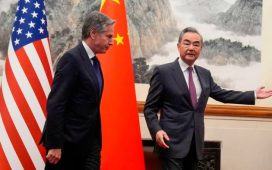Your editorial (The Guardian view on Johnson’s green jobs plan: the right way to start, 18 November) says much of the government’s headline-grabbing pledge of £12bn for its “green industrial revolution” is spending that has already been announced. This is typical of the Tory political chicanery that the country has become accustomed to since 2010.
But it beggars belief that at the same time – days before the spending review, when Rishi Sunak will almost certainly warn of impending austerity measures – the prime minister has agreed to a £16.5bn surge in “defence spending” (Boris Johnson agrees £16bn rise in defence spending, 18 November). It is true that, as Boris Johnson says, the “defence of the realm must come first”, but by equating “defence” with increased military spending, he reveals the limitations of his political understanding.
What is the point of increasing the defence capability of the UK against foreign adversaries when far greater threats exist from deadly viruses and global warming? Defending the people from illness and disease must also “come first”, as must defending children from food shortages, poverty and lack of education. A population’s security does not depend on military capability, but on a government’s willingness to spend money wisely to create healthy, happy and prosperous communities, to fund public services sufficiently, and provide decent jobs and living accommodation for all.
Bernie Evans
Liverpool
• There is rightly a great deal of scepticism about the government’s green “revolution”. Before even factoring in the suspect accounting, double-counting, and inclusion of previous funds/schemes as new, etc, it’s worth comparing the figure of £12bn for this “revolution” with the £11bn spent in 2019-20 on roads; £8.1bn on Brexit planning; £18.7bn for Crossrail, which has still yet to carry any passengers; £88.7bn-plus for HS2; or £22bn for Hinkley C.
Fourteen years after the Stern review, the notion that a fudged £12bn will foster a “green revolution” is laughable, and highlights how the climate breakdown is still not taken seriously. The response to Covid and historical examples such as the Apollo programme, the Marshall plan and the Manhattan project all show what is possible if the people and the government have the political will to declare war on climate breakdown.
David Ansell
London
• Real defence spending ensures there is good food for all, addresses climate change, biodiversity loss and inequality, secures health for all against threats like pandemics, and invests in seeking peace by peaceful means. These are the existential threats to human security this century. To address them needs a radical rethink about the meaning of defence and security; current global levels of spending on military approaches to defence – almost $2tn in 2019 – cannot address these challenges. Failure to do so only makes conflicts more likely, not less.
This is the time to progressively shift resources away from military approaches to national security in every country into activities that will truly defend people on this planet from these main threats, and to put much greater efforts into peacekeeping and peacemaking rather than gearing up for future conflicts, made all the more likely by the failure to use our resources to address these existential threats. Any claim to be climate leaders before Cop26 next year would recognise this challenge and see more investment in the underfunded “green industrial revolution” plan at a minimum.
Geoff Tansey
Food Systems Academy
Prof Paul Rogers
Bradford University








